|
|
|
Sort Order |
|
|
|
Items / Page
|
|
|
|
|
|
|
| Srl | Item |
| 1 |
ID:
187427


|
|
|
|
|
| Summary/Abstract |
Ever since China has formally joined the WHO-backed global COVID-19 vaccine initiative known as COVAX, there is a presumed notion that China’s vaccine diplomacy will make a significant contribution to the international public good and thus uplift Beijing’s role as the rule-maker of international order. To scrutinize this, the paper asks if China succeeded in proliferating its weaponized vaccine policy to obtain maximum diplomatic gains and soft power projection to intensify its international image, geopolitical power, and domestic politico legitimacy. The authors argue that despite its vaccine diplomacy demonstrated the robust governance capacity and responsibility to be a great power. Yet, Beijing’s geopolitical influence and international image are significantly overrated and not enough to play a more prominent role in the global power fulcrum/equilibrium. On the contrary, China enjoys a leading position on the domestic political front. Its successful portrayal of China’s vaccine provision in the global market and remarkable configuration to leverage a deep-rooted nationalism has fundamentally provided China with a powerful rationale to divert its public’s attention from Beijing’s earlier inadequate handling of the outbreak. The evaluation of the paper reveals that China’s vaccine diplomacy’s influence in promoting international image and geopolitics is limited but has successfully stabilized its domestic political environment and enhanced its domestic legitimacy.
|
|
|
|
|
|
|
|
|
|
|
|
|
|
|
|
| 2 |
ID:
189534
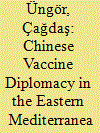

|
|
|
|
|
| Summary/Abstract |
This article examines China’s vaccine drive in Eastern Mediterranean countries of Türkiye, Egypt, Syria, Lebanon, and the Palestinian territories during 2020–2021 from a soft power angle.1 Although Chinese COVID-19 era health diplomacy is presented as a major breakthrough in the West, this study argues that continuities are more visible in the Eastern Mediterranean context with regard to China’s discourse and diplomatic practices. Beijing invested in the existing notions of propaganda, such as solidarity with developing countries, anti-Americanism, and economic partnership. In assessing the impact of Chinese vaccine diplomacy in the Eastern Mediterranean, the study investigates major diplomatic events and concludes that China could not improve its image in Türkiye in the aftermath of the COVID-19 pandemic.
|
|
|
|
|
|
|
|
|
|
|
|
|
|
|
|
| 3 |
ID:
183853
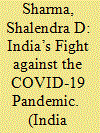

|
|
|
|
|
| Summary/Abstract |
In early 2020, when the COVID-19 pandemic was indiscriminately spreading around the world, the seeming ability of India, the world’s second most populous country (with over 1.3 billion people), to contain the virus within its borders and keep COVID-19 infection and mortality rates low relative to population size was seen as miraculous. However, the miracle ended when the ‘second-wave’ hit India in April 2021. On 1 May 2021, India became the first country in the world to record more than 400,000 coronavirus infections in a single day. This exponential rise in COVID-19 cases started on 28 April 2021 when India recorded 379,459 new COVID-19 cases and 3,647 deaths. This marked the eighth straight day of more than 300,000 cases a day—making India the second-highest COVID-19 case count in the world (over 20 million) with over 25 per cent of the global deaths from COVID. The following examines India’s fight against the pandemic, the failure to contain the second wave, the lessons learned and the way forward.
|
|
|
|
|
|
|
|
|
|
|
|
|
|
|
|
| 4 |
ID:
186837
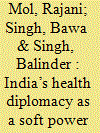

|
|
|
|
|
| Summary/Abstract |
India and Africa have been sharing a multidimensional relationship of cooperation and friendship since the ancient civilizations. The COVID-19 pandemic has brought new possibilities and opportunities for India to leverage its soft power diplomacy towards Africa. The paper’s main focus is to analyze how India has made soft power part of its foreign policy and examine India’s relationship with the African continent through health diplomacy. A literature search was done in major databases, such as Web of Science, Medicine/PubMed, Scopus, OVID, and Google Scholar search engine to gather relevant information. Through humanitarian assistance and geopolitical influence, India had won the support and heart of Africans. Besides, India has become a global healthcare provider in the African continent through its global health diplomacy and vaccine diplomacy. India has achieved impressive gains through its soft power diplomacy and has become a compassionate and benevolent actor in the African continent.
|
|
|
|
|
|
|
|
|
|
|
|
|
|
|
|
| 5 |
ID:
193027
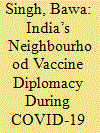

|
|
|
|
|
| Summary/Abstract |
In recent years, India has established itself as the world’s ‘pharmacy hub’, and this claim was proven once again when it delivered COVID-19 vaccines to its citizens, neighbouring nations and across the globe. Following the philosophy of humanitarianism through the principle of ‘Vasudhaiva Kutumbakam’, India has decided to provide the COVID-19 health assistance to its immediate neighbouring countries. India’s immediate neighbourhood refers to the countries that are geographically adjacent to it. In addition, India’s vaccine diplomacy has exposed geopolitical fault lines in South Asia as China’s vaccine diplomacy aims to outpace India in the region. Against this background, the main objective of this paper is to explain and examine India’s vaccine diplomacy as an instrument of its ‘Neighbourhood First’ policy during the COVID-19 pandemic. It argues that India’s health-focused approach has proved effective and aligned with its national interests. This review demonstrates that India’s health diplomacy has had an impact on medical and humanitarian assistance reciprocation at the regional and international levels. As a result of this strategy, during the second wave of the pandemic, India received medical devices and vaccines from other countries in dealing with COVID-19.
|
|
|
|
|
|
|
|
|
|
|
|
|
|
|
|
| 6 |
ID:
193186


|
|
|
|
|
| Summary/Abstract |
Since the outbreak of the COVID-19 pandemic, the authorities of Serbia have undertaken a concerted effort to secure China’s support in containing the coronavirus. This asymmetrical cooperation, apart from aspects concerning health security, has allowed both sides to obtain considerable political and economic benefits. This article examines how China and Serbia utilize pandemic cooperation to pursue and realize their wider foreign and internal policy goals through patron–client ties, as well as highlighting the pitfalls of this kind of relationship. Although the outbreak of the pandemic and the medical cooperation that followed do not constitute a turning point in the well-established relations between the two countries, the article argues that pandemic cooperation has considerably strengthened relations. In many ways, the pattern observed by the authors resembles China’s pandemic exchanges with other countries, especially smaller states with authoritarian inclinations.
|
|
|
|
|
|
|
|
|
|
|
|
|
|
|
|
| 7 |
ID:
188429


|
|
|
|
|
| Summary/Abstract |
This paper investigates the COVID-19 vaccine diplomacy of the United States and China in Vietnam and conceptualises Hanoi’s practical responses. The deployment of vaccine diplomacy is closely associated with US-China strategic rivalry and is thus labelled as proxy competition in this paper. This paper found that both Washington and Beijing leveraged vaccine diplomacy to achieve general strategic objectives and specific foreign policy objectives in relations with Vietnam. For the USA, vaccine donation consolidated Hanoi’s strategic trust in Washington during tough times. Meanwhile, despite widespread mistrust and suspicion regarding the quality and efficacy of Chinese-made vaccines amongst Vietnamese people, China’s vaccine donation to Vietnam could still prevent Hanoi from further spiraling into the US-led anti-China coalition. Nevertheless, Vietnam has constantly been at a crossroads, for it not only strives to respond reasonably to the USA and China at the international level but also has to accommodate the Vietnamese public’s policy preferences at the domestic level.
|
|
|
|
|
|
|
|
|
|
|
|
|
|
|
|
| 8 |
ID:
186783
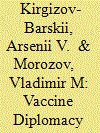

|
|
|
|
|
| Summary/Abstract |
With the COVID-19 pandemic in place for over two years now, it is
time to assess its main aspects and tendencies, and identify the new
features it has lent to the international relations landscape. This paper
studies two approaches different countries have taken in developing and
distributing COVID vaccines during the pandemic; these approaches are
defined as ‘vaccine diplomacy’ and ‘vaccine nationalism.’ Until recently,
vaccine diplomacy has played only a marginal role in international
relations, while vaccine nationalism has not been considered a problem
internationally.
|
|
|
|
|
|
|
|
|
|
|
|
|
|
|
|
|
|
|
|
|